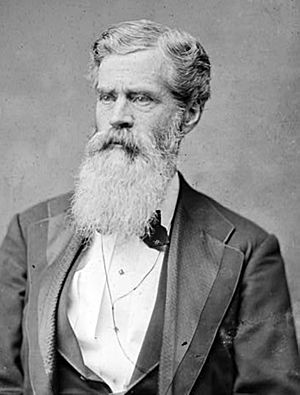Thomas M. Gunter facts for kids
Quick facts for kids
Thomas Gunter
|
|
|---|---|
 |
|
| Member of the U.S. House of Representatives from Arkansas's 4th district |
|
| In office March 4, 1875 – March 3, 1883 |
|
| Preceded by | District established |
| Succeeded by | Samuel W. Peel |
| Member of the U.S. House of Representatives from Arkansas's 3rd district |
|
| In office June 16, 1874 – March 3, 1875 |
|
| Preceded by | William W. Wilshire |
| Succeeded by | William W. Wilshire |
| Personal details | |
| Born | September 18, 1826 Warren County, Tennessee, U.S. |
| Died | January 12, 1904 (aged 77) Fayetteville, Arkansas, U.S |
| Political party | Democratic |
| Military service | |
| Allegiance | |
| Branch/service | Confederate States Army |
| Rank | |
| Unit | 13th Arkansas Infantry Regiment |
| Battles/wars | |
Thomas Montague Gunter (born September 18, 1826 – died January 12, 1904) was an important politician from Arkansas. He served as a U.S. Representative, which means he was a member of the U.S. Congress.
Contents
Early Life and Education
Thomas Gunter was born in 1826 near McMinnville, a town in Warren County, Tennessee. He went to college at Irving College and graduated in 1850. After college, he decided to study law. In 1853, he passed his exams and became a lawyer. He started his law practice in Fayetteville, which is in Washington County, Arkansas.
Service During the Civil War
During the American Civil War, Thomas Gunter joined the Confederate States Army. He held the rank of Colonel. He was in charge of the Thirteenth Regiment, which was a group of soldiers from Arkansas.
Political Career in Arkansas
After the Civil War, Gunter continued his career in law and politics. From 1866 to 1868, he worked as a prosecuting attorney. This job meant he was a lawyer who worked for the government to bring legal cases against people accused of crimes. He worked for the fourth judicial circuit, which is a specific area of the court system.
Serving in the U.S. Congress
Thomas Gunter was a member of the Democratic Party. In 1872, there was an election for the U.S. Congress. The winner was first declared to be William W. Wilshire. However, Gunter believed there were problems with the election results. After a long review, it was decided that Gunter was the rightful winner. He officially took his seat in Congress on June 16, 1874.
Gunter represented the Third Congressional District of Arkansas at first. Later, he was elected to represent the Fourth Congressional District. He served in Congress for many years, from June 16, 1874, until March 3, 1883. During his time in Congress, he was the chairman of a special committee called the Committee on Private Land Claims. This committee dealt with issues related to land ownership.
Supporting Native American Rights
One important thing Thomas Gunter did in Congress was to support the rights of Native American tribes. He believed that Native American groups should have the right to govern themselves and their lands. This idea is called "tribal sovereignty."
In 1880, there was a plan to move the Ute people from Colorado. Gunter spoke out against this plan. He said that the U.S. Government had always treated Native American tribes as the owners of their land. He explained that the government had respected the idea of tribes owning land together, not just individuals.
Gunter pointed out that tribes like the Creeks, Cherokees, Choctaws, Chickasaws, and Seminoles, who lived in the Indian Territory, were becoming "civilized tribes" under their system of shared land. He argued that this "communal system" (where land is owned by the community) helped Native peoples develop. He was against forcing Native Americans to divide their lands into individual plots, which often led to them losing their land to other citizens.
Later Life and Death
Thomas Gunter decided not to run for re-election in 1882. After leaving Congress, he went back to being a lawyer in Fayetteville, Arkansas. He passed away in Fayetteville on January 12, 1904, at the age of 77. He was buried in Evergreen Cemetery.
 | DeHart Hubbard |
 | Wilma Rudolph |
 | Jesse Owens |
 | Jackie Joyner-Kersee |
 | Major Taylor |

